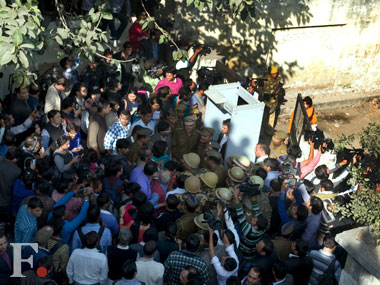Having cursorily gone through the 204-page judgment delivered by the special CBI court on Monday that convicted dentist couple Rajesh and Nupur of murdering their teenage daughter Aarushi and domestic help Hemraj, the defence expressed surprise at the findings of judge. The copy of the judgment will be made available to the Talwars’ lawyers tomorrow. Defence lawyer for the Talwars Tanveer Mir Ahmed said, “The judgment is beset with burden entirely shifted on to the accused under Section 106 of Evidence Act which is something very surprising.” [caption id=“attachment_125009” align=“alignleft” width=“380”]  The scene outside the court on Monday. Firstpost[/caption] Ahmed was speaking to reporters outside the court complex. Ahmed said that the judge had relied on the special provision of the Indian Evidence Act and found that “the accused should have given explanations.” Ahmed said that the defence respected the court’s order but disagreed with it and would challenge it. “Until now, there is no murder case where burden of proof has been shifted to the accused. To that extent the findings deserve challenge. We had also put forward before the trial court cases where three-bench and five-bench judgements of the Supreme Court have said that burden of proving guilt was on the prosecution.” Ahmed added, “The settled principle of law in any criminal trial is that burden rests on the prosecution and remains with the prosecution. Section 106 of Evidence Act is a very special provision which is connected to only knowledge of special facts. To what extent this provision can be stretched is something which shall be debated and we will lodge a challenge to this judgment on the basis of the findings that have been arrived at. We are well within our rights to do so.” Asked if there were good grounds for appeal, Ahmed said, “From the beginning, the CBI has maintained that they have no evidence. From the first closure report, this is a case where there is no evidence. Therefore in the appeal, the arguments we made here we’ll make those arguments again. The settled principles of law pertaining to circumstantial evidence have to be taken to a logical conclusion.” Ahmed reiterated that it was “very surprising” that in a murder case the burden of proof had been shifted to the accused. “This is unseen and probably has never happened before. To that extent I would say that in an appeal we would have more than enough material to argue.” Responding to a question on what the court had said on CBI’s theory that a golf club was the murder weapon, Ahmed said, “The court has gone on the aspect that there is no direct evidence and therefore many things, in my opinion, have been assumed (in the verdict). To what extent these assumptions will be proved right will be decided in the future.” Asked how the Talwars had taken the verdict, Ahmed said, “They are doing fine. We were prepared for any verdict. This is just a battle. The war is still to be fought. This has to be taken up to Supreme Court of India. And submissions that have not found favour here, we’ll make them in the High Court.”
Defence lawyer says the judge has relied on the special provision of the Indian Evidence Act and found that “the accused should have given explanations”.
Advertisement
End of Article


)

)
)
)
)
)
)
)
)



